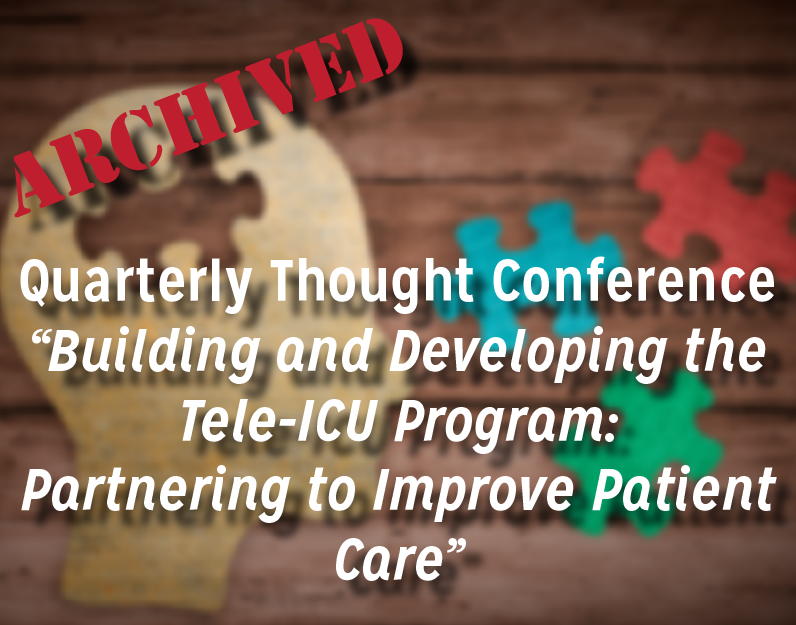Partnering to Improve Patient Care
Tele-ICU programs represent some of the finest integrations of on-site teams, remote teams, and technology to support and to improve patient care. This Quarterly Thought Conference from the South Central Telehealth Resource Center highlights the Tele-ICU program at Baptist Health in Little Rock, Arkansas, eICUcare. This program serves 16 hospitals across two states. Our speaker is Ms. Vicki Norman, RN, BSHA and the System Director of eICUcare. Ms. Norman provides thorough information and insights into this critical care telemedicine program including the delivery model, technology tools, innovations and program outcomes.
Follow-up Participant Questions:
Q: You mentioned areas of resistance and you spoke about capacity being one reason for resistance. You also mentioned “aversion” as a reason for resistance. Do you have some examples of aversion you can share?
A: Most of the time, it is about a fear of loss of control. Our physicians are very dedicated to good patient care and they want the best for their patients. As we established our program and started to gain that trust, what we found is that in the beginning, 90% of our physicians or medical staff at the bedside said, “Well, you can treat my patient in an emergency but I’m doing everything else.” Then, within a year, we had completely flipped that number to where 90% said do anything you need to for my patient, just keep me informed…we’ve just had a complete reversal of that by the end of the first year and now we are probably at 99% of our physicians are just delighted anything we do to help support their patient care.
Q: How did the the doctors on the receiving site and the health care worker on the patient site get reimbursed?
A: We don’t bill for anything from the tele-ICU. Our nurses and physicians are on salary. It is something that Baptist Health said it is just an investment to improve our quality of care and so we really look for opportunities for cost avoidance and that’s how we pay for ourselves. Because we don’t bill for anything, it doesn’t impact the bedside physician’s ability to bill and round on their patient just as they would in a place without a tele-ICU.
Q: Are you currently adding beds or seeking partner ICUs?
A: Yes, we absolutely are. We originally thought to have exclusive eICU license for our state and where we would be the only one and would keep it at Baptist Health. We also had a visionary leader who said this is good for Baptist Health; [and] this is good for anyone in Arkansas. So we want to work with anyone that wants to use this tool to improve care. There is a significant investment if you build your own hub so it is so much more economical for hospitals to partner instead of taking on all of those expenses on their own.
Q: If I came to you today and said, ‘I want to implement this program’, how long would it take to get up and running at my hospital?
A: We can do it in as little as 6 weeks. It all depends on what the ability is at the partner hospital for integration. [For instance,] if there are any heart monitors that need to be upgraded, then that would be outside the scope of partnering with us to make sure they were capable of sending the data that we need for patient care. That is usually the limiting factor is that some of the hospitals that we partner with are small, critical access hospitals that don’t have their own IT team or bio med in-house so it is more difficult for them to get those the resources that they need–we certainly help as much as we can with it but that’s usually the limiting factor. Otherwise, we can do it as quickly as 6 weeks.





